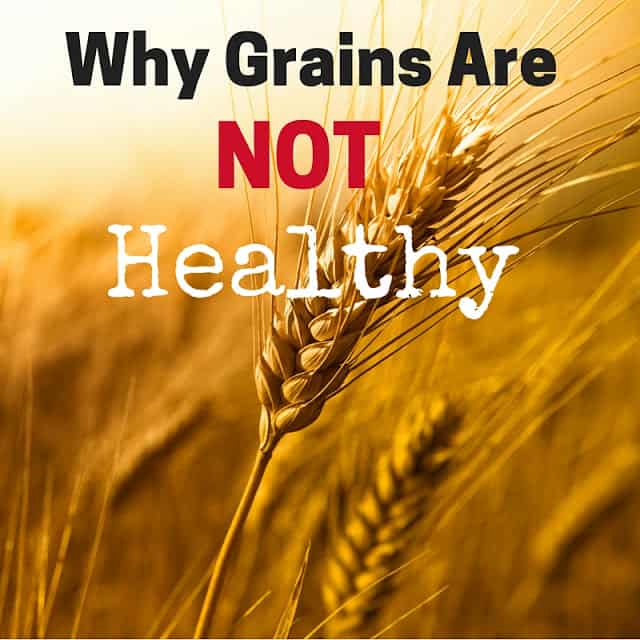Why grains are not healthy. This is an often over looked nutritional topic, but for those dealing with chronic illness or autoimmune diseases, grains are often not an ideal food choice, especially in the amounts that are typically recommended. In this post I will discuss all the reasons why grains are not a great food choice for some people.
Disclaimer: before making any dietary changes you should always consult with your own doctor or other health care practitioners.
Why grains are not healthy
I know this idea goes against everything you've been taught. If you follow the Canadian or American dietary guidelines or food guides you would think that grains are the be all and end all of a healthy diet and that grain consumption is necessary. Unfortunately, those food guides are based on poor science, and put together by folks that represent the grain board, the dairy board, and other such industries that ultimately profit from you consuming their food. And I am not just talking about gluten containing grains, but pretty much all grains, at least in the amount that is currently recommended.
One of the best things I ever did for my health was to cut out grains from my diet. I have seen such improvements in my health since doing so, and I have seen so many benefits in others who do this as well. Especially anyone dealing with a chronic disease, and even more important for those with an autoimmune disease. Now, there are many reasons why eating grains may not be the best option for everyone, and may not be as healthy as you thought. And I am not saying that everyone needs to cut out grains, but depending on the health issues you are dealing with, you may want to consider decreasing your grain intake or cutting them out completely. In this post I will discuss all the reasons why grains are not healthy, or not as healthy as you may have thought.
1. Why grains are not healthy: Lectins
Lectins are a plant protein that plant's created to help protect them from insect predators. There are very high concentrations in plant seeds, which is what we eat when we ingest grains (as well as legumes, dairy and night shades). Lectins are problematic because they can cause damage to the gut. Normally, the cells lining your intestine are held together by connections called tight junctions that prevent foods and other particles from leaking out of the gut. Unfortunately, lectins can damage these tight junctions allowing small food particles, bacteria and toxins to leak out of the gut into the bloodstream, and thus get exposed to the rest of your body. This is what is known as leaky gut syndrome. This exposure of bodily tissues to foreign substances leads to increased inflammation in the body. And in some susceptible people, this increased inflammation and exposure to foreign substances can contribute to autoimmune diseases, increased risk of heart disease, cardiovascular disease, high blood pressure, type 2 diabetes, irritable bowel syndrome, various skin conditions and many other health problems. In addition, beyond causing leaky gut, lectins make it more difficult to absorb the nutrients (vitamins and minerals) in foods. So while grains may be high in vitamins and minerals, your body actually absorbs very little of them. And ironically, the "whole grains" including grains like brown rice, whole wheat etc. that are most highly recommended by our food guides actually contain the highest concentration of lectins, thus causing the most harm and providing the poorest absorption of nutrients.
Here are some great references for lectins:
1. Lectins and autoimmune disease
2. Lectins and rheumatoid arthritis
2. Why grains are not healthy: Phytic acid
Phytic acid is the main storage form of phosphorus in many plant tissues, especially the bran part of grains and seeds. It is found in grains, seeds, legumes and nuts. Phytic acid works to protect the phosphorus by surrounding it in a snow-flake shaped molecule. Not only does this make it difficult for humans to utilize, but it also binds calcium, magnesium, iron, zinc and other minerals making them hard to use as well. This can cause problems such as tooth decay, bone loss and even poor growth and bone development in children. So again, while the grains themselves may contain important nutrients, your body can't actually absorb and use them. In addition, phytic acid also inhibits enzymes that are crucial for food digestion including pepsin, trypsin (for proteins), and amylase (for starch), again making it even harder to digest and utilize your food.
The good news? You can significantly lower the amount of phytic acid in grains, nuts, seeds and legumes by soaking, fermenting and dehydrating these foods. As well, soaking these foods increases the amount of phytase available which is an enzyme that helps break down phytic acid, decreasing the phytic acid content even more.
While beyond the scope of this post, The Weston A Price Foundation has a great article that explains everything related to phytic acid in much more detail. You can find it here.
3. Why grains are not healthy: Gliadin
Gliadin is a protein found in wheat gluten that is particularly damaging to the intestine. Gliadin causes the intestine to increase its production of a protein called zonulin which causes the tight junctions between gut cells to separate (again causing leaky gut). In patients with celiac disease, the body makes antibodies against gliadin which then directly damage the cells of the intestine. But just because you don't have celiac disease doesn't mean that gliadin is safe for you to eat. In fact, it is likely that humans were never intended to ingest gliadin in the amounts that we are doing so today, but that those with celiac disease are just extra susceptible to the damaging effects of this protein. It has also been found that patients with other autoimmune diseases form antibodies against gliadin, again implicating the role of this protein in many other conditions beyond celiac disease. Many diseases have been linked to problems with gliadin including an increased risk of diabetes, rheumatoid arthritis, depression, Sjogren's disease, and more.
Here are some references for gliadin:
1. Gliadin antibodies in rheumatoid arthritis and Sjogren's disease
2. Gastrointestinal antibodies in various autoimmune diseases
3. Tight junctions in celiac disease and type I diabetes
4. The role of IgG in depressive disorders
4. Why grains are not healthy: The Omega 6 Content
Okay quick nutrition lesson. Fats or fatty acids are classified based on the number of double bonds between the carbon atom: no double bonds are saturated, one double bond is mono-unsaturated and multiple double bonds are polyunsaturated. The polyunsaturated fatty acids are further classified as omega 3 or 6 based on the position of the last double bond (in omega 3's the bond is 3 from the end, and in omega 6's it is 6 from the end). These polyunsaturated fatty acids are considered essential nutrients because humans can't produce them, we only get them through the foods we eat. It is known that omega 3's have potent anti-inflammatory effects, while omega 6's can promote inflammation in the body. Ideally, our intake of omega 6 and 3 is in a ratio of 1-4:1. Unfortunately, the modern diet with its reliance on grain based foods leads to a ratio anywhere between 15-60:1. This shift in balance can lead to systemic body inflammation, and too much inflammation can contribute to or even cause a number of health problems including an increased risk of diabetes, heart disease, liver disease, autoimmune diseases, obesity, decreased cognitive function/memory loss, poor mood, various skin disorders and multiple neurological disorders. Almost every chronic disease has been linked to increased inflammation in the body, which is ultimately influenced by the amount of grains and grain based foods (including meat from grain-fed animals) we eat.
Those are just some of the ways why eating grains may not be ideal, and why grain free diets can be helpful for some people. And you may not need to go grain free completely. For some people even decreasing their grain consumption or cutting out certain grain food products including going gluten free can be helpful. Many grain products are highly processed, and we all know that limiting our processed food intake can have many health benefits.
If you are looking for more information on this topic, I highly recommend reading the book Wheat Belly. This book is full of helpful information and will help you understand even more why eating grains, especially grains such as wheat, is not ideal for everyone.
Now, before making any dietary changes you should always consult with your own doctor or other health care practitioners.
Since you made it this far we are basically best friends so be sure to follow me on Instagram, Pinterest, TikTok and Facebook where I share even more recipes and healthy living tips!
Other posts you will like:
- Is Quinoa Keto?
- Is quinoa paleo?
- The best non-toxic cookware
- How to choose non-toxic sunscreen
- Is there mercury in your mascara?






Anonymous
Excellent post & references!Love your blog!
Erin Carter
Thanks so much! xoxo
Tina
What about spouted grains. ..good bad?
Tina
What about spouted grains. ..good bad?
Erin Carter
Hey Tina. If you are going to eat grains sprouting is definitely the way to go. I would still not recommend that you make them a staple part of your diet but if you are looking to have them once in a while this can definitely be a healthy option that is much gentler on the gut.
athletic avocado
Great post!!!
Tina
sweet! Grains are not huge in my diet, but once in a while I enjoy sprouted grain toast with my eggs and avacado...:)
Erin Carter
Thank you!!! xoxo
Marie-Claude
Hi, did you post another paper on wich grains are ok?
thanks you
Marie-Claude
Erin Carter
I haven't but here is a great article from Weston A Price that talks about how to properly prepare grainshttps://www.westonaprice.org/video/proper-preparation-of-grains-and-legumes-video-by-sarah-pope/Hope that helps!